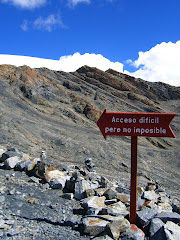
Here's me on a recent field trip with the police station youth group! (Random and unrelated to text.)
I'm happy to be back in sunny Piura. I didn't realize how much Lima's gray skies were weighing on my spirit. In Lima's backpacker hostels travelers from the northern hemisphere exploring Peru enlightened me. Listening to their impressions after my first impressions have long worn off reminded me of my own North American lens that I carry with me always. It's easy to forget it's there. But somehow when watching a trivia drinking game with Australians and Brits playing against my fellow countrymen my culture and homeland come rushing back. I love the US and my home, but it's easy to be insulated there. It's a big country, basically linguistically homogeneous, and yet quite proud of its diversity... which compared to a place like Peru with multiple language families, ecosystems, and conquerors is pretty tame.
It also occurred to me that sharing the workshop that my friend Libby and I did at training for the new volunteers this week might offer some insight into the life of a Peace Corps Volunteer. The class was about working with "community partners." When you get assigned to a community in Peace Corps you are also assigned a person and a local agency,your community partner. This can be a complicated relationship because you are not employed by or really beholden to this partner agency, nor are they to you. Libby's husband Ben labeled this the paradox of the professional volunteer. So for our workshop we wrote skits to try to get the new volunteers to problem solve around building these professional relationships.
Community Partner Episode #1: “Sabotaged by mediocrity"
After six months in site, you have a forged an outstanding partnership with the local office of an international NGO. This relationship has allowed you to funnel the NGO’s money and resources into an improved wood-burning stove project. Planning has gone well and the budget is fixed for the installation of thirty stoves in your community over a three month time period. The first few workshops go superbly and you are impressed with the preparation and professionalism of your NGO partners. As you enter the second month of the project and families are beginning to build their stoves, the project gets more intense and time consuming. A series of disappointing events transpire. The faithful NGO engineer arrives late to several meetings and the families complain about his punctuality (especially because timeliness has been a central theme of the project). He apologizes at the next meeting stating that projects elsewhere have also picked up pace and his office responsibilities have increased. A week later, he interrupts the training with the bad news that the budget has been cut and there are less materials available and, therefore, fewer families will receive support. The families are understandably upset and the next few meetings are dominated by logistical discussions about who should get the support. Because you live in the community much of the complaints fall on your shoulders. How do you feel? What should be your course of action?
Community Partner Episode #2: When did I become a rock star?
After having been at site 2 or 3 months you realize that a group of community members worked together to get you there. News to you. This group includes key community contacts: your socio comunitario (community partner) and other health post personnel, the school principal, mayor and city council member in charge of health. They are thrilled to have a gringa around and invite you to speak at EVERY possible public event from izamientos (weekly flag raising ceremonies) to kid’s parties to PTA meetings to begging you to sing the Star Spangled Banner at a ceremony with 500 people held to welcome you. How do you channel all of this excitement into action?
Community Partner Episode #6: Missing out?
You have a great, friendly relationship with your socio comunitario (community partner), the technician at the health post. He is professional, energetic, always follows through, and creates activities that are concrete and feasible. Because he is good at his job and a workaholic he is very, very busy and sometimes does not come to your community for several weeks at a time. You have a lot to do and like to work independently but realize that sometimes you miss out on health post events because no one told you about them. How do you feel? What should you do?
Friday, October 05, 2007
Back to El Solazo Norteño
at 11:02 AM
Subscribe to:
Post Comments (Atom)

No comments:
Post a Comment